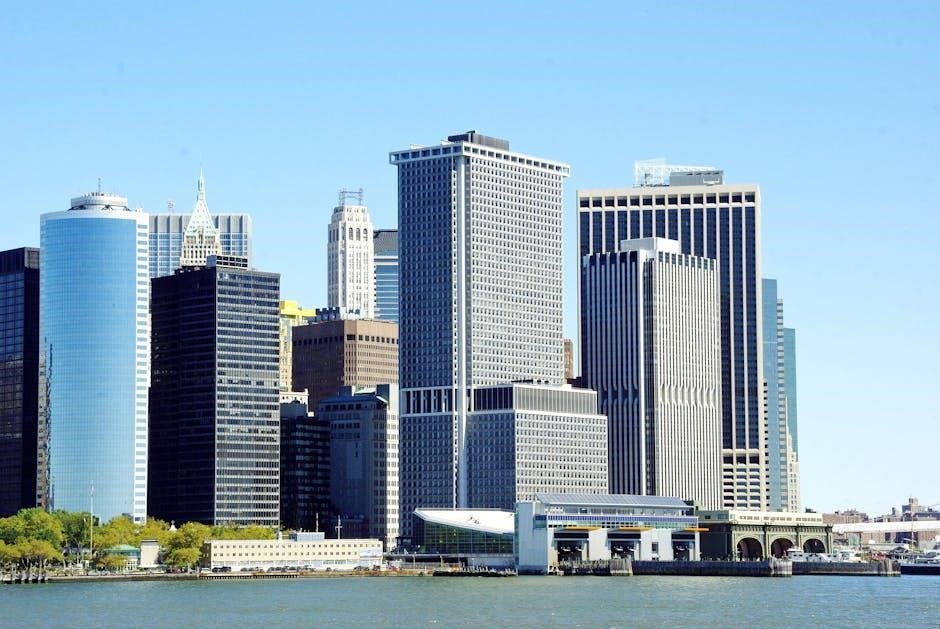America faces a moral crisis, with declining empathy and rising meanness, as explored by David Brooks. Social media, individualism, and institutional failures exacerbate this cultural shift, fostering isolation and division.
Overview of the Topic
David Brooks’ work explores America’s moral decline, emphasizing the erosion of shared values and the rise of meanness. He attributes this shift to societal fragmentation, institutional failures, and cultural shifts. Brooks highlights how declining moral formation in institutions like families, schools, and communities has left generations without a clear moral compass. The rise of social media and individualism has further exacerbated this decay, fostering isolation and polarization. Brooks argues that this moral crisis manifests as increased incivility, loneliness, and bitterness, with people often turning to politics as a form of therapy. His analysis calls for a cultural revolution to revive moral frameworks and rebuild a sense of community and shared purpose.
The Importance of Moral Formation in Society
Moral formation is essential for fostering empathy, responsibility, and kindness, which are critical for societal cohesion. Strong moral frameworks guide individuals in treating others with respect and dignity, promoting a harmonious community. Without these foundations, societies risk descending into chaos and division. Brooks emphasizes that moral education shapes individuals into compassionate citizens, capable of contributing positively to society. When moral formation falters, self-interest and incivility prevail, eroding trust and cooperation. Rebuilding moral culture is vital to restore unity and address social challenges effectively.

David Brooks’ Perspective on America’s Social Crisis
David Brooks argues that America is experiencing a profound social crisis characterized by increasing meanness and moral decay. He attributes this decline to the erosion of institutional roles in moral formation, such as families, schools, and religious groups, which once fostered kindness and responsibility. Brooks contends that the rise of individualism and the decline of community have left people feeling isolated and morally adrift. He also highlights the impact of social media, which amplifies divisive behavior and contributes to a culture of incivility. Brooks emphasizes the need for a cultural revolution that revives moral frameworks and promotes empathy, arguing that without such a transformation, societal cohesion and unity will continue to unravel.

The Decline of Moral Formation in America
America’s moral formation has declined as institutions like families, schools, and religious groups fail to shape kindness and responsibility, leading to a self-referential, isolated society.
Erosion of Institutional Roles in Shaping Morality
Institutional roles in shaping morality have eroded significantly, leaving a void in moral education. Families, schools, and religious groups, once central to fostering kindness and responsibility, now struggle to fulfill these roles. This decline has led to a morally inarticulate generation, where individuals lack a shared moral framework. The breakdown of these institutions has resulted in a society where self-interest often outweighs collective well-being. Without strong institutional guidance, moral values are no longer transmitted effectively, contributing to the rise of meanness and fragmentation. Brooks argues that reviving these institutions is crucial to rebuilding a morally cohesive society, emphasizing their role in nurturing empathy and civic responsibility.
The Impact of Social Media on Moral Decay
Social media has significantly contributed to moral decay by fostering division and amplifying negative behaviors. Platforms prioritize controversial content, spreading anger and polarization. Anonymous interactions encourage meanness, as individuals feel less accountable for their actions. Brooks highlights how social media erodes empathy, turning complex issues into simplistic moral battles. This environment cultivates a culture of outrage, where people seek validation through tribalistic behavior rather than meaningful dialogue; The constant exposure to negativity normalizes incivility, further fragmenting society. While not the sole cause, social media’s role in exacerbating moral decline is undeniable, as it reshapes how individuals interact and perceive morality in a increasingly isolating digital world.
Intersection of Economic Inequality and Meanness
Economic inequality has deepened social divisions, fueling meanness across America. Brooks argues that financial disparities create environments where bitterness and resentment thrive. Those who feel economically marginalized often experience social invisibility, leading to feelings of injustice. This sense of exclusion fosters anger and hostility, as individuals lash out at perceived oppressors. The erosion of economic mobility exacerbates these tensions, leaving many feeling trapped and unheard. Brooks emphasizes that while economic inequality is real, it is not the sole driver of meanness, but it amplifies existing social fractures. The lack of shared prosperity undermines empathy, creating a toxic cycle where financial struggles breed interpersonal conflict and societal division, further entrenching America’s moral crisis.

Cultural Factors Contributing to Meanness
The erosion of community and rise of individualism have fueled loneliness and bitterness, with social media amplifying mean behavior and division.
Rise of Individualism and Decline of Community
The rise of individualism and decline of community bonds have significantly contributed to meanness in America. As people focus more on personal achievements and less on collective well-being, shared moral values erode. This shift has led to social fragmentation, where loneliness and bitterness prevail. The decline of community institutions, such as families, schools, and religious groups, has reduced opportunities for moral formation and empathy. Brooks argues that this cultural shift has created a society where self-interest dominates, leaving individuals disconnected and less inclined to care for others. The erosion of communal ties has fostering a meaner, more isolated society, emphasizing the need for renewed focus on rebuilding moral frameworks and community connections.
The Role of Polarization in Exacerbating Meanness
Polarization has intensified meanness in America by deepening divisions and fostering an “us versus them” mentality. Brooks highlights how political and social polarization have created echo chambers, where individuals only engage with like-minded views, reinforcing hostility toward opposing groups. This polarization has eroded empathy and civility, turning public discourse into a battleground. The media and social platforms amplify divisive rhetoric, further entrenching these divisions. As a result, citizens increasingly view others as enemies rather than fellow community members, leading to widespread meanness and a breakdown of constructive dialogue. This toxic environment undermines the shared moral fabric necessary for a cohesive society, making it challenging to address the root causes of social fragmentation. Polarization thus acts as both a symptom and a driver of America’s growing meanness.
Psychological Effects of Loneliness and Bitterness
Chronic loneliness and bitterness have profound psychological effects, fueling meanness in American society. Brooks notes that when individuals feel unseen, unheard, and disrespected, their social pain often manifests as bitterness. This emotional state leads to resentment and anger, causing people to lash out at others. Loneliness erodes empathy, making it harder to connect with others, while bitterness creates a sense of injustice, further alienating individuals. Over time, these feelings can become entrenched, fostering a cycle of meanness and isolation. The psychological toll of loneliness and bitterness not only harms personal well-being but also weakens social bonds, contributing to the broader moral crisis. Brooks emphasizes that addressing these emotional wounds is crucial for rebuilding a compassionate and connected society.
The Moral Crisis in America
America faces a moral crisis, with a breakdown of shared values and a decline in moral formation, as highlighted by David Brooks. This erosion has led to widespread meanness, fueled by social media, economic inequality, and psychological distress, creating a fractured society in need of renewal.
Breakdown of Shared Moral Values
The erosion of shared moral values has deeply contributed to America’s moral crisis, as highlighted by David Brooks. Once-unifying principles like empathy, respect, and kindness are increasingly fragmented, leading to widespread meanness. This breakdown is rooted in the decline of institutional roles, such as families, schools, and religious groups, which historically fostered moral formation. Without a common moral framework, individuals struggle to navigate societal expectations, resulting in division and self-interest. Brooks emphasizes how this moral incoherence has created a culture of isolation and bitterness, where people often prioritize personal gain over collective well-being. The absence of shared values exacerbates societal meanness, as individuals lose a sense of responsibility to one another and the broader community.

Role of Education in Moral Inarticulacy

Education’s role in moral inarticulacy, as discussed by David Brooks, lies in its failure to equip generations with a clear moral language. Schools and universities increasingly focus on technical skills and self-expression, neglecting the development of ethical reasoning and shared values. This shift has left many young people without the tools to articulate or understand moral principles, fostering a morally adrift society. Brooks argues that without a strong moral education, individuals struggle to engage in meaningful dialogue or address societal issues with empathy and wisdom. This educational gap contributes to the broader cultural meanness, as individuals lack the framework to navigate conflicts or build connections based on shared moral understanding, exacerbating societal fragmentation and isolation.
Media’s Role in Normalizing Mean Behavior
The media plays a significant role in normalizing mean behavior, as highlighted by David Brooks. Platforms prioritize sensationalism and conflict over constructive dialogue, amplifying divisive rhetoric. Reality TV, social media, and partisan news outlets often glorify aggression and dismiss empathy, creating a culture where meanness is not only accepted but also rewarded. Brooks emphasizes that this cycle perpetuates a broader societal shift, where individuals emulate the behaviors they consume. Algorithms fuel this trend, as content that provokes anger or outrage gains more traction. Consequently, the media landscape reinforces a culture of incivility, contributing to the erosion of kindness and shared moral values, which Brooks argues is central to America’s moral crisis.

Rebuilding Moral Culture
Reviving institutional moral frameworks and fostering community connections are crucial. Moral education and grassroots movements can rebuild trust and unity, promoting a culture of kindness and shared values.
Importance of Reviving Institutional Moral Frameworks
Institutions like families, schools, and religious groups historically shaped moral values, fostering kindness and responsibility. Their decline has left a void, contributing to societal meanness and fragmentation. Reviving these frameworks is essential to rebuild trust and unity. By reintegrating moral education and community engagement, institutions can guide individuals toward empathy and shared purpose. Strong institutional roles counteract the erosion of social bonds and the rise of self-interest. They provide structures for mentorship, accountability, and the transmission of ethical norms, which are critical for healing America’s moral divide. Without robust institutions, the cycle of loneliness and bitterness will persist, hindering efforts to restore a cohesive moral culture.
Leadership’s Role in Promoting Moral Renewal
Leadership is pivotal in fostering moral renewal by setting ethical standards and inspiring collective action. According to Brooks, leaders must emphasize both financial success and moral responsibility. They should model empathy, integrity, and humility, creating environments where moral values thrive. Effective leaders prioritize long-term societal well-being over short-term gains, encouraging a cultural shift toward kindness and respect. By championing moral principles, leaders can rebuild trust and unity, essential for addressing America’s social crisis. Their role involves not only policy-making but also nurturing a shared sense of purpose, guiding society toward a more compassionate and cohesive future.
Grassroots Movements and “Weavers” of Social Fabric
Grassroots movements and individuals, termed “weavers” by David Brooks, play a vital role in repairing America’s social fabric. These local leaders foster community connections and moral cohesion through small, consistent actions. They often work outside formal institutions, creating spaces for dialogue and mutual support. Brooks highlights their ability to counter societal fragmentation by nurturing trust and empathy. Unlike top-down approaches, grassroots efforts prioritize personal relationships and collective responsibility. By empowering ordinary people to take ownership of their communities, these movements offer a hopeful path toward moral renewal. Their impact lies in their ability to inspire others, creating a ripple effect that strengthens societal bonds and promotes kindness and understanding on a broader scale.
America’s path forward lies in reviving moral formation and fostering community. Brooks emphasizes the need for collective action to overcome meanness and rebuild social cohesion.
Path Forward for Cultural Revolution
David Brooks envisions a cultural revolution rooted in moral renewal and communal healing. He advocates for reviving institutional roles in shaping morality, emphasizing the importance of “weavers” who rebuild social fabric. By fostering empathy and shared values, society can overcome meanness and division. Brooks suggests that leaders must champion moral clarity, while grassroots movements can inspire collective action. Education and personal responsibility are key to restoring a sense of purpose and unity. Addressing economic inequality and polarization is also critical to healing societal fractures. Ultimately, Brooks calls for a shift from individualism to community-focused values, urging Americans to embrace a cultural transformation that prioritizes kindness, respect, and moral coherence.
Hope and Renewal in America’s Moral Landscape
Despite the moral crisis, David Brooks offers a hopeful vision for renewal. He emphasizes the potential for collective healing through the efforts of “weavers”—individuals and communities who rebuild social connections. By reviving institutional moral frameworks and fostering empathy, America can rediscover its sense of shared purpose. Brooks suggests that personal responsibility and a renewed focus on kindness can help bridge societal divides. The path to renewal lies in embracing a cultural shift that values community over individualism and prioritizes moral coherence. While the challenges are significant, Brooks believes that through grassroots movements and leadership, America can reclaim its moral identity and create a more compassionate and unified future.
